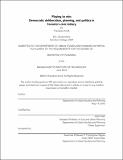| dc.contributor.advisor | Justin Steil. | en_US |
| dc.contributor.author | Krolik, Theodore | en_US |
| dc.contributor.other | Massachusetts Institute of Technology. Department of Urban Studies and Planning. | en_US |
| dc.coverage.spatial | n-cn-on | en_US |
| dc.date.accessioned | 2016-10-25T19:17:20Z | |
| dc.date.available | 2016-10-25T19:17:20Z | |
| dc.date.copyright | 2016 | en_US |
| dc.date.issued | 2016 | en_US |
| dc.identifier.uri | http://hdl.handle.net/1721.1/104988 | |
| dc.description | Thesis: M.C.P., Massachusetts Institute of Technology, Department of Urban Studies and Planning, 2016. | en_US |
| dc.description | This electronic version was submitted by the student author. The certified thesis is available in the Institute Archives and Special Collections. | en_US |
| dc.description | Cataloged from student-submitted PDF version of thesis. | en_US |
| dc.description | Includes bibliographical references (pages 180-196). | en_US |
| dc.description.abstract | Government institutions across the world are currently experimenting with randomized household-selection engagement methods designed to maximize the diversity and representativeness of their sampled citizen participants. Varieties of "mini-publics" have been asked to deliberate on topics as wide-ranging as electoral reform and health care policy. As they have become more widespread, the focus of randomly selected citizen bodies has also been moving from topics debated at the national and state level to more practical questions affecting specific cities and communities. In this thesis project, I examine what happens when a city planning agency develops its own "mini-public" that is neither a one-off event nor supervised by elected officials. The heart of my research is an investigation of the Toronto Planning Review Panel, a "civic lottery" initiative begun in fall 2015 by the City of Toronto Planning Division intended to cover a broad spectrum of city planning topics over the course of multiple years. I present initial analysis of not only what the Panel looks like in practice, but also how it performs as a deliberative body. Though I consider the outlook of both volunteer and professional participants, I place special emphasis on the convening agency's perspective. I make a contribution to the extensive theoretical discussion by assessing the potential long-term ramifications for governance when city agencies form "mini-publics." While I present evidence to show that the Panel's contributions toward social justice and effectiveness immediately strengthen the legitimacy of the Planning Division's staff reports, I also argue that the Panel's popular element could eventually serve to validate the entire Planning Division within Toronto's larger "deliberative system." | en_US |
| dc.description.statementofresponsibility | by Theodore Krolik. | en_US |
| dc.format.extent | 196 pages | en_US |
| dc.language.iso | eng | en_US |
| dc.publisher | Massachusetts Institute of Technology | en_US |
| dc.rights | M.I.T. theses are protected by copyright. They may be viewed from this source for any purpose, but reproduction or distribution in any format is prohibited without written permission. See provided URL for inquiries about permission. | en_US |
| dc.rights.uri | http://dspace.mit.edu/handle/1721.1/7582 | en_US |
| dc.subject | Urban Studies and Planning. | en_US |
| dc.title | Playing to win : democratic deliberation, planning, and politics in Toronto's civic lottery | en_US |
| dc.title.alternative | Democratic deliberation, planning, and politics in Toronto's civic lottery | en_US |
| dc.type | Thesis | en_US |
| dc.description.degree | M.C.P. | en_US |
| dc.contributor.department | Massachusetts Institute of Technology. Department of Urban Studies and Planning | |
| dc.identifier.oclc | 959979594 | en_US |
